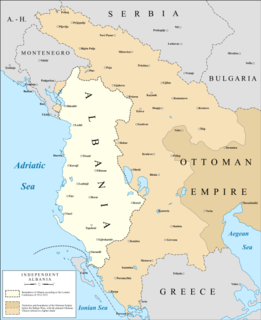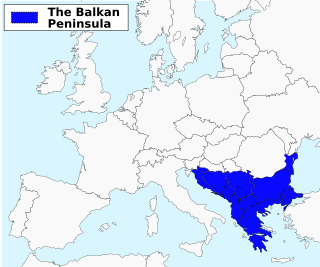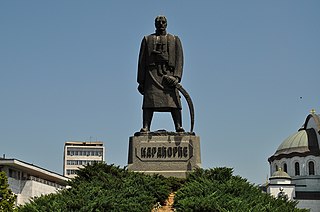
The Balkans, also known as the Balkan Peninsula, is a geographic area in southeastern Europe with various geographical and historical definitions. The region takes its name from the Balkan Mountains that stretch throughout the whole of Bulgaria. The Balkan Peninsula is bordered by the Adriatic Sea in the northwest, the Ionian Sea in the southwest, the Aegean Sea in the south, the Turkish Straits in the east, and the Black Sea in the northeast. The northern border of the peninsula is variously defined. The highest point of the Balkans is Mount Musala, 2,925 metres (9,596 ft), in the Rila mountain range, Bulgaria.
Nationalism is an idea and movement that holds that the nation should be congruent with the state. As a movement, nationalism tends to promote the interests of a particular nation, especially with the aim of gaining and maintaining the nation's sovereignty (self-governance) over its homeland to create a nation state. Nationalism holds that each nation should govern itself, free from outside interference (self-determination), that a nation is a natural and ideal basis for a polity and that the nation is the only rightful source of political power. It further aims to build and maintain a single national identity, based on shared social characteristics of culture, ethnicity, geographic location, language, politics, religion, traditions and belief in a shared singular history, and to promote national unity or solidarity. Nationalism, therefore, seeks to preserve and foster a nation's traditional culture. There are various definitions of a "nation", which leads to different types of nationalism. The two main divergent forms are ethnic nationalism and civic nationalism.

Yugoslavia was a country in Southeast Europe and Central Europe for most of the 20th century. It came into existence after World War I in 1918 under the name of the Kingdom of Serbs, Croats and Slovenes by the merger of the provisional State of Slovenes, Croats and Serbs with the Kingdom of Serbia, and constituted the first union of the South Slavic people as a sovereign state, following centuries in which the region had been part of the Ottoman Empire and Austria-Hungary. Peter I of Serbia was its first sovereign. The kingdom gained international recognition on 13 July 1922 at the Conference of Ambassadors in Paris. The official name of the state was changed to Kingdom of Yugoslavia on 3 October 1929.

Greater Albania is an irredentist and nationalist concept that seeks to unify the lands that many Albanians consider to form their national homeland. It is based on claims on the present-day or historical presence of Albanian populations in those areas. In addition to the existing Albania, the term incorporates claims to regions in the neighbouring states, the areas include Kosovo, the Preševo Valley of Serbia, territories in southern Montenegro, northwestern Greece, and a western part of North Macedonia.

The term Greater Romania usually refers to the borders of the Kingdom of Romania in the interwar period, achieved after the Great Union. It also refers to a pan-nationalist idea.

The term Greater Serbia or Great Serbia describes the Serbian nationalist and irredentist ideology of the creation of a Serb state which would incorporate all regions of traditional significance to Serbs, a South Slavic ethnic group, including regions outside modern-day Serbia that are partly populated by Serbs. The initial movement's main ideology (Pan-Serbism) was to unite all Serbs into one state, claiming, depending on the version, different areas of many surrounding countries.
Anti-Slavic sentiment, also known as Slavophobia, a form of racism or xenophobia, refers to various negative attitudes towards Slavic peoples, the most common manifestation is the claim that the inhabitants of Slavic nations are inferior to other ethnic groups. Anti-Slavism reached its peak during World War II, when Nazi Germany declared Slavs, especially neighboring Poles to be subhuman (Untermensch) and planned to exterminate the majority of Slavic people.

The Balkans and parts of this area are alternatively situated in Southeast, Southern, Eastern Europe and Central Europe. The distinct identity and fragmentation of the Balkans owes much to its common and often turbulent history regarding centuries of Ottoman conquest and to its very mountainous geography.

Greater Croatia is a term applied to certain currents within Croatian nationalism. In one sense, it refers to the territorial scope of the Croatian people, emphasising the ethnicity of those Croats living outside Croatia. In the political sense, though, the term refers to an irredentist belief in the equivalence between the territorial scope of the Croatian people and that of the Croatian state.
Pan-nationalism is a specific term, used mainly in social sciences as a designation for those forms of nationalism that are trying to transcend (overcome) traditional boundaries of basic national identities, in order to create a "higher" pan-national (all-inclusive) identity, based on various common denominators. Pan-nationalism can occur as a specific variant of all common forms of nationalism. In relation to classical state nationalism, pan-nationalism manifests itself through various political movements that are advocating the creation of "higher" (pan-national) forms of political identity, based on a regional or continental grouping of national states. In terms of ethnic nationalism, pan-nationalism can also manifest itself through specific ethnic movements that are advocating the creation of "higher" (pan-national) forms of common identity that is based on ethnic grouping. Other forms of nationalism also have their pan-national variants.
Serbianisation or Serbianization, also known as Serbification, and Serbisation or Serbization is the spread of Serbian culture, people, and language, either by social integration or by cultural or forced assimilation.

The Socialist Republic of Serbia, previously known as the People's Republic of Serbia, was one of the six constituent republics of the Socialist Federal Republic of Yugoslavia. Its formation was initiated in 1941, and achieved in 1944–1946, when it was established as a federated republic within Yugoslavia. In that form, it lasted until the constitutional reforms from 1990 to 1992, when it was reconstituted, as the Republic of Serbia within the Federal Republic of Yugoslavia. It was the largest constituent republic of Yugoslavia, in terms of population and territory. Its capital, Belgrade, was also the federal capital of Yugoslavia.

Serbian nationalism asserts that Serbs are a nation and promotes the cultural and political unity of Serbs. It is an ethnic nationalism, originally arising in the context of the general rise of nationalism in the Balkans under Ottoman rule, under the influence of Serbian linguist Vuk Stefanović Karadžić and Serbian statesman Ilija Garašanin. Serbian nationalism was an important factor during the Balkan Wars which contributed to the decline of the Ottoman Empire, during and after World War I when it contributed to the dissolution of the Austro-Hungarian Empire, and again during the breakup of Yugoslavia and the Yugoslav Wars of the 1990s.

Anti-Serb sentiment or Serbophobia is a generally negative view of Serbs as an ethnic group. Historically it has been a basis for the persecution of ethnic Serbs.

In expansionism, states expand their territory through military empire-building or colonialism.
Among scholars of nationalism, a number of types of nationalism have been presented. Nationalism may manifest itself as part of official state ideology or as a popular non-state movement and may be expressed along civic, ethnic, cultural, language, religious or ideological lines. These self-definitions of the nation are used to classify types of nationalism. However, such categories are not mutually exclusive and many nationalist movements combine some or all of these elements to varying degrees. Nationalist movements can also be classified by other criteria, such as scale and location.
National mysticism or mystical nationalism is a form of nationalism which raises the nation to the status of numen or divinity. Its best known instance is Germanic mysticism, which gave rise to occultism under the Third Reich. The idea of the nation as a divine entity was presented by Johann Gottlieb Fichte. National mysticism is closely related to Romantic nationalism, but goes beyond the expounding of romantic sentiment, to a mystical veneration of the nation as a transcendent truth. It often intersects with ethnic nationalism by pseudohistorical assertions about the origins of a given ethnicity.
Anti-Croat sentiment is discrimination or prejudice towards Croats as an ethnic group and negative feelings towards Croatia as a country.










